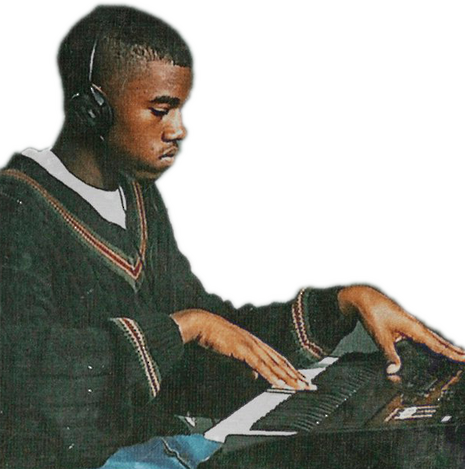Album: Kanye West – The Life of Pablo
Henry Goodwin gives his verdict on Kanye’s seventh album

First it was So Help Me God. Then it was Swish. Then it was Waves. Then it was The Life of Pablo. Now, it’s here. The build-up to Kanye West’s seventh album has been a whirlwind of name changes, uncertainty, megalomania and excitement. Still Kanye maintains that it’s not finished; it’s not perfect. The Life of Pablo has felt cobbled together, even sloppy. Much like the hand-written tracklists that were repeatedly tweeted and amended, then amended some more and tweeted again, the album felt a bit rushed. The release was repeatedly delayed, and even the album’s celebratory debut at Madison Square Garden suffered technical problems. All this contributed to a sensation that fans of Kanye West aren’t accustomed to: trepidation.
How wrong we were to entertain the possibility that The Life of Pablo might not live up to expectations. It is another triumphant return for an artist that has always saved his best work for albums; it’s difficult to think of a better creator of albums not just in hip-hop, but in music generally. Kanye’s talent for production has always shone through in his feature-length projects, and Pablo is no exception. West is able to draw together so many diverse and seemingly disparate musical elements and house them seamlessly under one roof. The delicate gospel of album opener Ultralight Beam contrasts sharply with the desolate and wintry auto-tune of 808s & Heartbreak’s throwback Wolves, and yet the two seem perfectly at home as the album’s beginning and intended pre-Madison Square Garden ending. Kanye has never been afraid to take and repackage famous pieces of music (Otis, Gold Digger), and here he reminds us of his inimitable audacity.
Unlike Yeezus, which explored the sonic boundaries of hip-hop, The Life of Pablo sees many more guest appearances. Chance The Rapper’s central role in this project is clear throughout; Ultralight Beam is basically a Chance the Rapper song. In fact, it might include the best Chance verse we’ve ever heard, and positions the young Chicagoan as the modern incarnation of The College Dropout-era Kanye West. When he states: “I made Sunday Candy, I’m never going to hell”, it feels like a transition from cult darling to mainstream hitter. No More Parties in LA sees a barnstorming verse by the prolific Kendrick Lamar; Rihanna’s vocals on Famous are juxtaposed with those of Nina Simone to underline just how high her stock is at the moment; reclusive R&B icon Frank Ocean adds dense mystery to Wolves; The Weeknd’s haunting vocal on FML is evidence of an artist at the very top of his game.
However this album remains all about Kanye. Before release, Pablo was already receiving worldwide notoriety for a certain line about a certain Taylor Swift. It’s hard to sympathize with this version of Kanye West, which appears throughout the record. “My ex said she gave me the best years of her life / I saw a recent picture of her, I guess she was right” on 30 Hours is the perhaps the harshest line of Kanye’s career. Lyricism has never been West’s strongest suit, and this is clear again on Pablo. He can comes across as the heavy-handed, “BILL COSBY INNOCENT!!!!!!!!!!” Kanye West who continually draws such public ire. But amid all the bluster, there is some intense emotional exposure in some of Pablo’s lyricism. Real Friends, unquestionably the best track on the album, sees him revisit the Welcome To Heartbreak Kanye; an outsider at his own family events, unable to trust those around him, always having to marginalise his loved ones. There’s an intimacy on this record that has not been seen since 808s.
Ultimately, this is an album that highlights the very best of Kanye West. It manages to balance bold brush strokes and genuine openness, intense arrogance and real vulnerability. One line from Feedback sums this best, as West challenges the listener: “Name one genius that ain’t crazy”. Call him crazy, flawed, arrogant, whatever. The Life of Pablo reinforces one undeniable fact: Kanye West’s genius is irrepressible.
For another perspective, see Jack Wearing's review
 News / Colleges charge different rents for the same Castle Street accommodation2 March 2026
News / Colleges charge different rents for the same Castle Street accommodation2 March 2026 News / News in Brief: waterworks, wine woes, and workplace wins 1 March 2026
News / News in Brief: waterworks, wine woes, and workplace wins 1 March 2026 News / Climate activists protest for ‘ethical careers policy’1 March 2026
News / Climate activists protest for ‘ethical careers policy’1 March 2026 News / Angela Merkel among Cambridge honorary degree nominees27 February 2026
News / Angela Merkel among Cambridge honorary degree nominees27 February 2026 News / Private school teacher who lied about Cambridge degree barred from teaching27 February 2026
News / Private school teacher who lied about Cambridge degree barred from teaching27 February 2026








